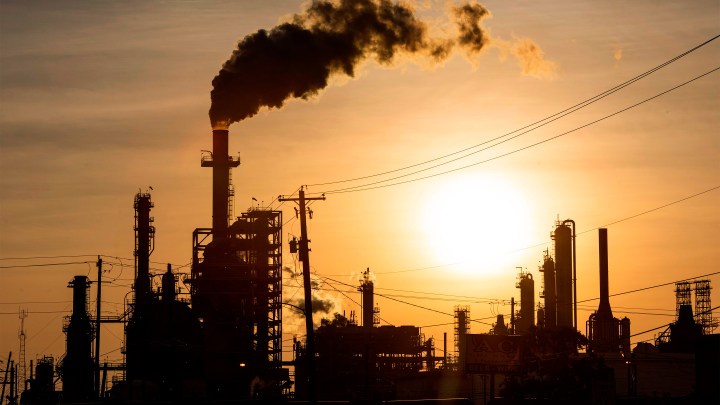
What’s the historic connection between high oil prices and recession?
What’s the historic connection between high oil prices and recession?

Oil prices are way up, in large part because of the war in Ukraine and reports that the U.S. and EU are considering banning oil imports from Russia as a result.
At one point over the weekend, oil prices reached their highest point since 2008. Gas in the U.S. is now more than $4 a gallon.
Historically, big oil shocks have often preceded recessions. Let’s go back to 1973 when the U.S. supported Israel in the Arab-Israeli War. Arab countries in OPEC imposed an oil embargo against the U.S. (and other countries), which caused oil prices to soar, said Michael Klein at Tufts University’s Fletcher School of Business.
“The increase in oil prices led to it becoming much more expensive to purchase a range of things, much more expensive to produce things, much more expensive to heat your home, or to fill the gas tank in your car,” he said.
That contributed to a recession. “We’ve moved away from the level of oil dependence that we had back in the early 1970s, but it’s still a very important factor in the economy,” Klein said.
Whether you see it or not, oil goes into almost everything.
“It’s an input to a lot of stuff that we make. And that’s where the real sort of spillover effect happens,” said Joann Weiner, an economics professor at The George Washington University.
She said oil is such a big part of how so many things are produced and transported that when the price goes up, “that puts pressure on retail prices going up … leading the Fed to say inflation is too high, we better cut it back, raise interest rates. Businesses say, ‘Oh, we can’t afford to borrow anymore, Oh, we better stop investing.’ And then boom, you now have your slowdown in economic growth.”
There is also another factor at play, and that’s expectations. During economic downturns, Weiner said, “a lot of what happens … depends upon what people expect to happen.”
That’s why Robert Johnston at the Columbia Center for Global Energy Policy said the measure he’s looking at is: “What price does retail gasoline need to get to to put the U.S. into a recession?”
With gas prices rising so fast, “I think we have some real risk of sort of an inflation-led and consumer confidence-led recession,” Johnston said, adding that there are things the government could do, like pass another stimulus package, that might blunt the effect of higher gas prices.
There’s a lot happening in the world. Through it all, Marketplace is here for you.
You rely on Marketplace to break down the world’s events and tell you how it affects you in a fact-based, approachable way. We rely on your financial support to keep making that possible.
Your donation today powers the independent journalism that you rely on. For just $5/month, you can help sustain Marketplace so we can keep reporting on the things that matter to you.











